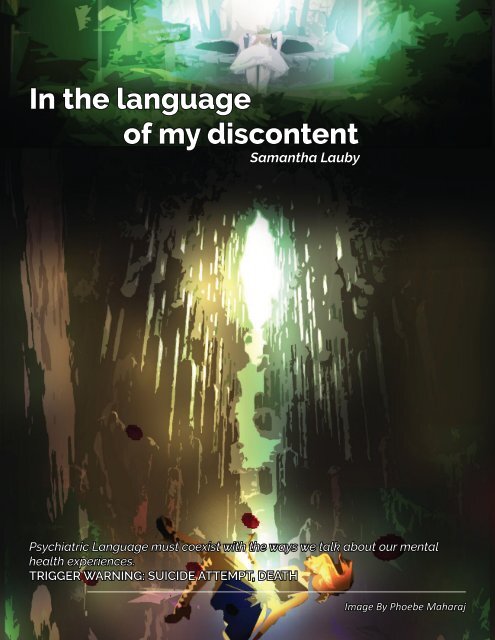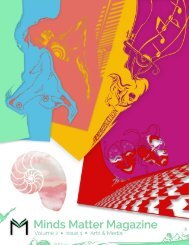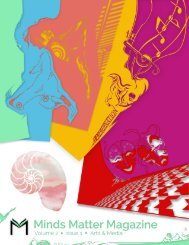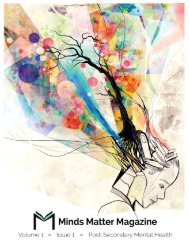Culture & Identity
Create successful ePaper yourself
Turn your PDF publications into a flip-book with our unique Google optimized e-Paper software.
Minds Matter Magazine Volume III Issue I <strong>Culture</strong> & <strong>Identity</strong><br />
In the language<br />
of my discontent<br />
Samantha Lauby<br />
Psychiatric Language must coexist with the ways we talk about our mental<br />
health experiences.<br />
TRIGGER WARNING: SUICIDE ATTEMPT, DEATH<br />
Image By Phoebe Maharaj<br />
Coming out of the rabbit hole is not easy.<br />
It involves motivation, patience, a touch of<br />
creativity and one rule: don’t let the Queen<br />
of Hearts take your head.<br />
I tell my experiences with mental<br />
health as metaphors because experiences<br />
are beyond the limits of our language. I identify<br />
with Alice’s Adventures in Wonderland<br />
because the timing of the recent adaptation<br />
coincided with a major transition in my<br />
life. I was leaving my hometown to pursue<br />
post-secondary education. I was going to a<br />
new environment—one that would provide<br />
the structure to let me thrive.<br />
I did not want to go.<br />
I had a small network of therapists,<br />
psychiatrists and medical doctors I knew I<br />
would lose if I moved away. Steeped in the<br />
language of psychiatry, I was convinced that<br />
my death would be under my control - a<br />
suicide attempt that I couldn’t survive. The<br />
aura of hopelessness that the language<br />
provided made recovery seem impossible<br />
and distress inescapable. I did not think I<br />
would live beyond my twenty-fifth birthday.<br />
Almost two years after entering University,<br />
I was in recovery. Over my recovery, I<br />
have adopted another metaphor: The Matrix.<br />
I have chosen to take the red pill by reducing<br />
psychotropic medications to a minimum and<br />
shedding the language of psychiatry. This is<br />
not an easy transition, but I am already reaping<br />
the rewards.<br />
With my own language, I can advocate<br />
for my needs and learn to live with quirks<br />
that people called a “disorder.” It is organized<br />
chaos, thank you very much.<br />
Along this 13-year journey, I was plastered<br />
with labels like “generalized anxiety d<br />
isorder,” “depression with psychotic features,”<br />
“borderline personality disorder,”<br />
and, most recently, “schizoaffective disorder.”<br />
Though I cannot think of myself as having<br />
these labels today, they will stick with me for<br />
the rest of my life, shrouding the beauty of<br />
my inner world.<br />
I have experienced more stigma in<br />
recovery than while I was suffering under<br />
these labels. If I express any distress, people<br />
- especially medical professionals - start to<br />
question my recovery. While it is optional to<br />
talk to acquaintances about my stresses, it is<br />
required to talk, and be judged by, a professional<br />
stranger. This stigma is amplified when<br />
they know I am on a medication diet.<br />
The language of psychiatry spreads<br />
with the biomedical model - the view that<br />
mental health conditions are caused by<br />
abnormalities in the brain. I fear that this<br />
stigma I experience will become more widespread.<br />
It does not matter if the finger of<br />
blame is pointed at my actions, my mind,<br />
or my brain - if the language that surrounds<br />
these labels (e.g., “deficit,” “faulty wiring,”<br />
“inflexible”) does not change, we all suffer.<br />
Katie Kilroy-Marac, an anthropology<br />
professor at University of Toronto Scarborough,<br />
also fears that a strict biomedical approach<br />
can ignore our experiences and how<br />
we can grow from them.<br />
But Kilroy-Marac says this language<br />
may help some narrate their experiences.<br />
29






